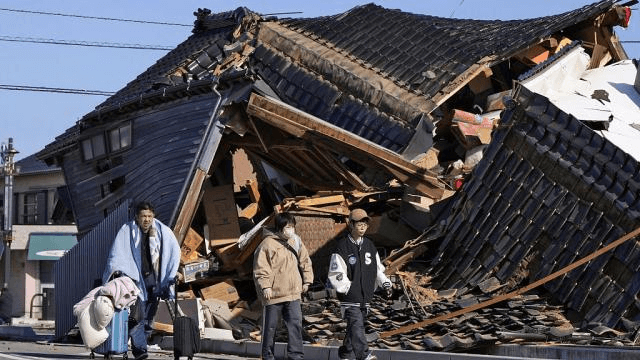Japan Earthquakes
Japan Earthquakes, Scary start to 2024 in Japan with Series of Earthquakes.
The Earthquake and Tsunami Alert
In Japan, a series of earthquakes hit the country, with at least 50 earthquakes reported. The most significant impact was felt in central Japan in a province called Ishik Kava, where the earthquake measured 7.6 on the Richter scale. The tremors have stopped for now, but the major concern is the possibility of a tsunami. As a precautionary measure, Japan has started evacuating coastal areas and issued a major tsunami alert, the first since 2011.
Damage and Injuries
Fortunately, there have been no reported deaths so far, although six people are trapped under the rubble. The earthquake caused some roads to crack, and a fire broke out in Wajima City. However, injuries have been limited, mostly involving broken bones. One significant impact of the earthquake is the disruption of the power supply, leaving around 34,000 homes without electricity.
Tsunami Alert
Japan has a history of tsunamis caused by earthquakes, especially when they are large and close to the sea. In response to the earthquake, a tsunami alert has been issued, urging residents living along the Sea of Japan coast to evacuate. The highest warning is in the Noto Peninsula in the Ishikawa Province, where officials have warned of 16 ft high waves. While no major tsunamis have been observed yet, smaller waves have been spotted. The alert has also been extended to South Korea, North Korea, and parts of Russia.
Preparedness and Readiness
Japan is no stranger to earthquakes and has developed infrastructure and policies to mitigate the impact. Most buildings in the country are designed to withstand earthquakes, including houses, hospitals, and schools. The designs and materials used in construction are strictly regulated. Disaster readiness is also emphasized from a young age, with earthquake drills being a common practice in Japanese schools. The mantra in Japan is to always be prepared for tremors, even if they cannot be predicted.
Why Japan is Prone to Earthquakes ?
Japan’s location makes it vulnerable to earthquakes. It is situated on the Pacific Ring of Fire, where four tectonic plates intersect: the Pacific, North American, Eurasian, and Filipino plates. When these plates move and collide with each other, tremors are caused. If these tremors occur on land, earthquakes are experienced, while underwater tremors can lead to tsunamis. Despite the risks, Japan has adapted to living in this geologically active area.

Remaining Vigilant
The next few hours will be crucial as officials have warned of potential aftershocks that could determine the final scale of the disaster. Japan’s experience and preparedness have put them in a better position to deal with earthquakes compared to other countries. However, tsunamis remain a significant challenge, as walls of water cannot be prepared against. Let’s hope that the situation does not escalate to that level.
Overall, Japan’s response and readiness to earthquakes and tsunamis serve as a model for other countries facing similar geological risks. The combination of strict regulations, resilient infrastructure, and disaster preparedness education has proven effective in minimizing the impact of these natural disasters. As the country continues to face the threat of earthquakes and tsunamis, their experience serves as a reminder of the importance of being proactive and prepared in the face of such challenges.
Please visit for more Christian stuff :
Visit : https://onewaytheonlyway.com
Quora : https://onewaytheonlyway.quora.com
Pinterest : https://in.pinterest.com/madhuym2012/
Facts Blog : https://factsblog.in
Tumblr: https://www.tumblr.com/blog/onewaytheonlyway
YouTube : https://www.youtube.com/c/Tysonpaul




Recent Comments